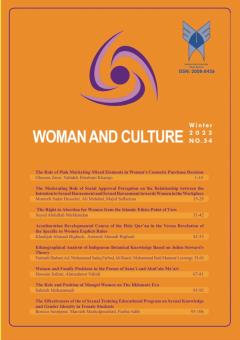حق سقط جنین برای زنان از دیدگاه اخلاق اسلامی
الموضوعات :
1 - سطح 4، رشته فقه و اصول، حوزه علمیه قم، قم، ایران.
الکلمات المفتاحية: اخلاق اسلامی, سقط جنین, زنان,
ملخص المقالة :
هدف پژوهش حاضر بررسی حق سقط جنین برای زنان در اخلاق اسلامی میباشد. جامعه پژوهش کلیه متون و منابع مکتوب اخلاق اسلامی میباشد. نمونه پژوهش مطالب مرتبط با حق سقط جنین برای زنان در اخلاق اسلامی بود. روش پژوهش توصیفی- تحلیلی است. دادهها به صورت تحلیل محتوا انجام شد. نتایج نشان داد که دو استدلال عمده در مورد سقط جنین ارادی، در بین متفکرین غیرمسلمان وجود دارد؛ یکی استدلال بر تملک مادر بر بدن خود برای سقط جنین و دیگری شخصانیت جنین. با توجه به دیدگاه اخلاق اسلامی در خصوص سقط جنین مشخص شد که استدلال بر تملک مادر بر بدن خود برای سقط جنین تا اندازهای درست است؛ به این معنا که مادر در صورت متضرر شدن در برخی موارد میتواند اقدام به سقط کند. همچنین معیار شخصانیت اجمالاً از دیدگاه اخلاق اسلامی مورد قبول واقع شده است؛ و در این زمینه شارع مقدس مبنایی مطرح میکند که فصل الخطاب و در حقیقت دلیلی نقلی و تعبدی است. از این منظر، جنین پیش از چهارماهگی شخص محسوب نمیشود. این دیدگاه در خصوص شخصانیت جنین را میتوان شخصانیت اسلامی نام نهاد که با آنچه دانشمندان علوم تجربی میگویند متفاوت است. در آموزههای اسلامی سقط جنین به صورت اختیاری و ارادی که به مرگ جنین منتهی شود، مشروع نیست مگر در جایی که جان مادر در خطر است و یا اینکه روح در جنین دمیده نشده و وجود آن برای مادر ضرر غیرمتعارف و قابلملاحظهای داشته باشد.
The Holy Quran.
A group of researchers. (2009). The culture of jurisprudence according to the religion of Ahl al-Bayt. Qom: Islamic Encyclopedia Institute. [Persian] URL: https://www.gisoom.com/book/1263001/
A group of researchers. (2010). Dictionary of principles of jurisprudence. Qom: Islamic Science and Culture Research Institute. [Persian] URL: https://bookroom.ir/book/51895/
Ahmed ebn Fares, A. (1983). Ma'jam Maqais al-Logat [The dictionary of linguistic comparisons]. Qom: Islamic Propaganda Office. URL: https://qps.ir/productdetail/18342/
Al Boyeh, A. (2011). A woman's right to control her own body. Review, 16(62), 29-60. [Persian] URL: https://www.noormags.ir/view/fa/articlepage/973783/
Ansari, M. (1995). Faraed al-Osool [The pearls of the science of principles of jurisprudence]. Qom: Al-Nashar al-Islami Foundation of Jama'ah al-Madrasin. URL: https://qps.ir/productdetail/8963/
Coleini, M. (1986). Al-Kafi [enough]. Proofreader: Ali Akbar Ghaffari and Mohammad Akhundi. Tehran: Dar al-Katb al-Islamiya. URL: https://noorlib.ir/book/info/1348/
Eslami, H. (2004). The right to the life of the fetus, four ethical approache. The Appendix of Hamshahri's Wisdom 1(24), 14-15. [Persian] URL: http://www.noormags.com/view/fa/articlepage/98851
Fazel Lankarani, M. (2004). including all issues. Qom: Amir Qalam Publications. [Persian] URL: https://noorlib.ir/book/info/10561/
Ibn Baboyeh, M. (1992). Men la yahzara al-faqih [Someone who is not a jurist with him]. Edited by: Ali Akbar Ghafari. Qom: Al-Nashar al-Islami Institute of Jama'ah al-Madrasin. URL: https://qps.ir/productdetail/32602/
Ibn Manzoor, M. (1993). Lesan Alarab [Arab Language]. Beirut: Dar al-Fakr Lettabaah and Al-Nashar and Al-Tawzi'a - Dar Sadr. URL: https://qps.ir/productdetail/9471/
Khamenei, A. (2001). Resaleh Ajvabat Alesteftaat [Treatise on answers to questions]. Translator: Ahmadreza Hosseini. Tehran: Hoda International Publications. [Persian] URL: https://www.digikala.com/product/dkp-6304625/
Khoei, A. (1995). Serat Alnejat (Al-Mohashsha) [The Path of Salvation (Along with annotations)]. Corrected by Musa Mofiduddin Asi Ameli. Qom: El-Elect Publishing School. URL: https://noorlib.ir/book/info/261/
Majlesi, M. (1982). Bahar Al-Anwar [seas of light]. Beirut: Dar Ehiya al-Trath al-Arabi. URL: https://noorlib.ir/book/info/1407/
Marquis, D. (2001). The article "Evidence on the wrongness of abortion" in the book "Philosophy of Ethics, Essays on Normative Ethics, Trans-Ethical Applied Ethics". Translated by Mahmoud Fathali. (2008). Qom: Education publishing office, 237-264. [Persian] URL: https://www.gisoom.com/book/1488355/
Mesbah Yazdi, M. (2012). Ethics in the Qur'an. Research and writing: Mohammad Hossein Eskandari. Qom: Publications of Imam Khomeini Institute (RA). [Persian] URL: https://www.ghbook.ir/index.php?option=com_dbook&task=viewbook&book_id=1000352001&Itemid=&lang=fa
Mustafavi, H. (1988). Altahqiq Fi Kalemat Alqor'an Alkarim [Researching the words of the Holy Qur'an]. Tehran: Ministry of Culture and Islamic Guidance. URL: https://lib.eshia.ir/71460/1/4
Oliphant, J. (2007). OCR Religious Ethics for As and A2. in Taylor & Francis Group. London: Routledge. URL: https://www.routledge.com/OCR-Religious-Ethics-for-AS-and-A2/Oliphant-Mayled/p/book/9780415523578
Rasekh, M. (2003). Jadaal Hayat, an overview of abortion theories. Legal research, 1(38), 165-208. [Persian] URL: http://www.noormags.ir/view/fa/articlepage/71947
Hosain Sharifi, A. (2011). What is applied ethics?. Moral knowledge, 7(1), 83-96. [Persian] URL: https://www.noormags.ir/view/fa/articlepage/898720/
Singer, P. (2004). Environmental ethics. Translated by Alireza Al Boyeh. (2007). Journal of Criticism, 1(45&46), 141-169. [Persian] URL: http://www.noormags.ir/view/fa/articlepage/331326
_||_

